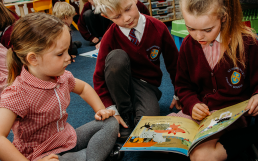- Home
- Teaching & Learning
- Early Reading & Phonics
Early Reading & Phonics
At St Oswald’s C of E Primary, reading is at the heart of our curriculum; we recognise that reading is crucial and fundamental to the educational success of all our pupils. Reading provides an opportunity to develop a rich vocabulary, influence high quality writing and also provide a gateway to success in other subjects. But more than this, we want our children to also develop a love of reading that will inspire them to open their minds to a world of adventures and opportunities where they can flourish.
Children begin to learn to read from their very first day at St Oswald’s by listening to lots of stories, rhymes and songs. Adults read to the children daily in school and are keen to make sure that all children learn to read themselves as soon as possible. The children will learn to read by:
-
- Learning synthetic phonics through our ‘Bug Club Phonics’ Programme
- Learning high frequency and irregular words by sight
At St Oswald’s C of E Primary, we teach Phonics using ‘Bug Club Phonics’ a DfE approved systematic synthetic phonics programme. Bug Club Phonics is a comprehensive phonics teaching programme designed to build children’s confidence and enjoyment of reading at the very start of their reading journey. Phonics teaching happens across EYFS and KS1 at the start of every day. Children will learn new phoneme grapheme correspondences and practise the ones they have previously learned. They will then begin to apply these skills to sound out and blend words to read and write. In addition to this they will begin to learn ‘irregular’ words (words that can not be sounded out using phonics) by sight.
Our reading journey begins with wordless books….

Wordless Books
A wordless book is a book that tells a story purely through the illustrations. Sharing wordless books is a terrific way to build important literacy skills, including listening skills, vocabulary, comprehension — and an increased awareness of how stories are ‘built’ as the storyteller often uses a beginning, middle, end format. For a book with few words, you’ll be surprised at all the talking you will do, and all the fun you’ll have! Additional skills include identifying the front cover, holding books correctly, turning pages right to left, talking about pictures and treating books with respect.
The next step in our reading journey is reading decodable reading books…
Once children can confidently recognise phoneme/grapheme correspondences and they are able to blend them together they will begin to read ‘Decodable’ books.
Decodable Books

Decodable books are books that contain words made up from phonemes/graphemes that children know. All of our home reading books are phonetically decodable and link to our phonics scheme ‘Bug Club’ as is best practice.
Once the children have started to learn Phase 2 sounds, can recognise them by sight and begin to blend independently we will start to send home decodable reading books. Pupils are individually assessed on their phonics knowledge and each child is given a book that is accessible for them at their level, so that the child can read it and enjoy it. Research suggests that children should be able to fluently read 90-95% of the book independently, this not only increases their engagement and enjoyment but also allows the child to become a confident reader.
Each child is assessed regularly to establish whether a book is at the right level for the child’s phonic ability. The children will also receive sound cards and/or some high frequency or irregular words to learn alongside their reading book.
To help your child learn to read at school, children will benefit from a daily shared read, a daily phonics session and one guided reading session per week with either a Teacher or Teaching Assistant. At home, we would like your child to read their school reading book over and over again, allowing them to increase in confidence and focus on a different reading skill each time they read the book. This is known as ‘The Three Read Approach’.
The Three Read Approach
In Reception and Year 1 reading books are changed on Tuesdays and Fridays. This gives you time to complete three reads of each book as detailed below:
| Read 1 Decoding the book |
Children use their phonics knowledge to decode the words on the page. The focus is solely on this rather than the comprehension and understanding. |
| Read 2 Reading for speed and fluency |
This is another opportunity for the pupils to apply their phonic knowledge but slightly quicker. Pupils should recognise some of the words the second time round. Adults should model prosody (intonation, expression, pausing and phrasing) when they read and children apply this skill. |
| Read 3 Comprehension |
This time, the pupils read the book again and should be quite familiar with the words. Ask your child what they think about the story and what is happening as they read: do they understand what they are reading? Can they retell it in their own words? |
We encourage you to supplement our home reading scheme with a variety of books including fiction, non-fiction and poetry that you share with your child to further develop their love for reading and provide a wide breadth of experiences.
(Reading books will only be changed when all three reads have been completed / signed off)
Supporting Your Child at Home
We fully understand that as parents, you want the very best for your child and as a result we often get asked “Can we have a harder reading book?” For us, reading is not just about decoding words – there are many other skills that make a child a good reader! As we are continually assessing the children and sending books home that are appropriate to their phonic level we expect that they will be able to read most of the book, if not all of it in one go. Once children have learnt the skill of decoding words and recognising words by sight the focus shifts to how they read the book. Can they read fluently, without having to stop and sound out a word? Can they use intonation, expression and pause at appropriate times? Do they have a good understanding of what they have read? Can they answer questions about the text or the vocabulary? Can they retell it in their own words?
We therefore encourage you to supplement our home reading scheme with a variety of books from your home or the local library including some that are at a more advanced level if you wish as you will be sharing them together. These can include fiction, non-fiction and poetry. You can share books by simply reading to your child, taking it in turns to read a sentence or a page at a time, demonstrating your ‘storyteller’ voice or even looking at more advanced vocabulary if you wish. All of this will further develop their love for reading and provide a wide breadth of experiences.
In addition to our home readers we also have access to an online reading scheme.
Bug Club Online Reading Scheme
Bug Club is an online reading scheme. Each child will have a personalised webpage where their class teacher will add interactive, fun eBooks to their ‘online reading bag’. Again, the books are phonically decodable and assigned according to your child’s phonics level. Throughout the books there are quizzes for your child to complete and in return your child will earn ‘ActiveLearn Coins’ to ‘buy’ rewards! We will send the login details for this once your child has started their reading journey!
